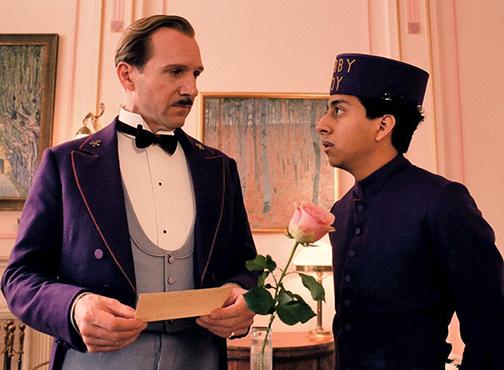“The Grand Budapest Hotel” is a Wes Anderson film. Meaning, the director’s quirks are well present. The film is set in the Republic of Zubrowka, a fictional European nation, and the republic’s ornate architecture looks straight out of a storybook. Anderson’s characters have names like M. Gustave and Dmitri Desgoffe-und-Taxis, many either sporting bourgeois clothing or a fancy mustache.
Beyond his choice of fashion and sets, Anderson has a remarkable style that focuses attention on color palette and symmetry. And in “The Grand Budapest Hotel,” both elements work in a powerful way. Every outfit in the hotel is a bold shade of color, such as the solid purple uniforms, and placed against a soft pink wallpaper or bright orange rug for an eye-appealing effect. Each scene is meticulously choreographed to maintain balance in the frame. By the quality of Anderson’s shots alone, “The Grand Budapest Hotel” is an incredible film to watch.
The film tells the early days of hotel owner Zero Moustafa (played as a young man by Tony Revolori) as a lobby boy to the hotel caretaker M. Gustave (Ralph Fiennes). As the two visit the wake of Madame D. (Tilda Swinton), one of Gustave’s close hotel clients, Gustave learns he is the inheritor of her valuable painting, “Boy with Apple.” This inheritance enrages the rest of Madame D.’s family, especially her son Dmitri Desgoffe-und-Taxis (Adrien Brody). Soon, the family is after Gustave, Zero and “Boy with Apple.”
Anderson unfolds the plot through creative and sometimes humorous segues. As it progresses, the simple story becomes a complex web of conflicts between its characters. What started as Gustave wanting to pay respects to a dear friend turns into a big mess involving greed, blood and loyalty.
Loyalty especially plays a powerful theme to the film. Gustave’s relationship with those around him moves the movie forward. The bond between Gustave and Zero is the biggest and most important element in the original flick. Though an unlikely pair at first, the two plays as a dynamic duo and eventually build a golden friendship. In the end, “The Grand Budapest Hotel” reminds how powerful relationships can be when you least expect it.
Also read: Art exhibition shoots our reality
Photo courtesy of Fox Searchlight Pictures/MCT












